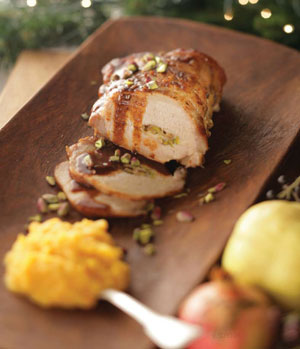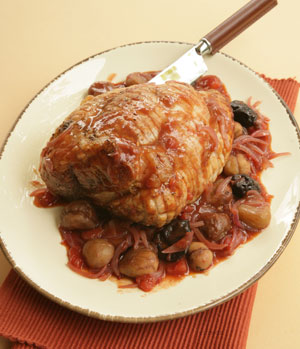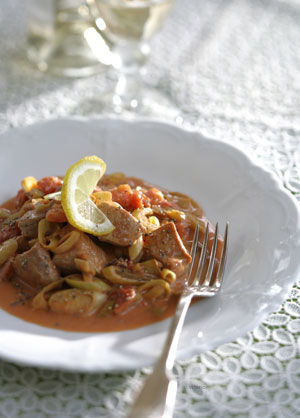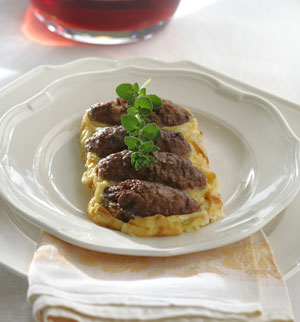
Pork Roulade with Naxos Graviera
Pork Roulade with Naxos Graviera and Nuts
Adapted from my latest book, The Country Cooking of Greece (Chronicle, 2012)
Serves 4-6
1 kilo (2lbs) leg of pork, trimmed and butterflied
8 garlic cloves, minced
300 g (11oz) Naxos graviera cheese, diced
½ cup pistachios, coarsely chopped
Grated zest and juice of 1 lemon
Salt and freshly ground black pepper to taste
½ cup extra virgin olive oil
2 cups dry white wine
½ cup lightly toasted pine nuts, coarsely chopped
1. Preheat the oven to 375˚F/190˚C.
2. Wash and pat the meat dry. Place on a large cutting board and pound the meat slightly with a meat mallet. Season the exposed side lightly with salt and pepper. Sprinkle with garlic, cheese, pistachios, pepper and lemon zest. Roll up into a tight cylinder and secure closed with string. Season the roulade generously with salt and freshly ground black pepper.
3. Place a flameproof baking pan large enough to hold the pork roulade on the stove top over medium-high heat. Add olive oil and when hot sear the meat in the pan, turning, until browned on all sides. Pour in the wine and as soon as it steams up, remove the pan from the flame. Cover the pan and transfer to the oven. Roast, covered, for about 2 hours, or until the pork is tender and thoroughly cooked. Check the meat during roasting and add water as needed to keep it moist. About 15 minutes before removing from heat, add lemon juice. A few minutes before removing from oven, add the chopped pine nuts and walnuts. Remove, cool slightly, and serve.

Macedonian Pork Roast with Chestnuts & Prunes
Macedonian Pork Roast with Chestnuts and Prunes
Serves 6-8
1 pork butt, about 2 kilos (4lbs)
Salt and freshly ground black pepper
1/2 cup extra virgin Greek olive oil
1 1/2 cups dry red wine
6 medium onions, divided in two, chopped in thin slices
1 1/2 cup tomatoes, peeled, seeded and cut in small pieces (alternatively use tinned)
1 kilo (2lbs) chestnuts, boiled and peeled
2 cups pitted prunes
1. Preheat the oven to 375°F/190°C. Oil and season the pork loin generously with salt and pepper. Heat a large, wide pan on medium-high heat and sauté the meat on all sides until golden. Pour ½ cup of the wine into the pan and cook until half has evaporated, about 4 minutes. Oil a large clay/ceramic or ovenproof baking pan and place the browned meat in the pan
2. Place the pan back on low heat and add the onions. Sautee the onions in the oil pork drippings for about 10 minutes or until soft. Add the tomatoes, half the chestnuts and remaining cup of wine. Season with salt and pepper and cook for a few minutes to thicken slightly. Pour the sauce over the meat. Cover the ovenproof dish with foil and roast for 2-2 1/2 hours, or until meat is tender. Half way through cooking, add the rest of the chestnuts, the prunes and enough water or additional wine to keep the meat moist. Remove from oven, let cool slightly and serve.

Naoussa Style Braised Pork with Leeks
Naoussa Style Braised Pork and Leeks
This is a northern-Greek-pan dish, one of the all time classics and favorites on the Sunday and festive table. In Naoussa, the addition of tomatoes to the dish distinguishes it from other versions around the region. Locals say the best cut for this is pork collar.
Serves 4-6
½ cup extra virgin northern Greek olive oil
1 ½ kilo (3 lbs) pork, preferably shoulder or collar, cut into stewing size pieces
Salt and pepper to taste
750gr (1½ lbs) leeks, trimmed and coarsely chopped
1 cup blanc de noir Xinomavro wine, or other dry white northern Greek wine
1 cup chopped tomatoes, with juice
Water
3 egg yolks
Juice of 1-2 lemons, to taste
1. Heat the olive oil in a large, wide pot over high heat and brown the meat. Season with salt and pepper. Add the leeks and stir until soft. Pour in the wine. As soon as it steams up, add the tomatoes. Add enough water to cover the contents of the pot by about two-thirds. Cover, raise heat to high, and bring to a boil. Reduce heat and simmer the stew until the meat is very tender, about 2 hours.
2. In a medium size metal bowl whisk together the egg yolks and half the lemon juice until smooth and thick. Take one ladleful of the pot juices, careful not to take up any solids, and very slowly drizzle the liquid into the egg mixture, whisking vigorously. Repeat with a second ladleful. Remove meat from heat and pour in the egg-lemon mixture. Tilt the pot back and forth to distribute the egg mixture evenly. Adjust seasoning with additional salt, pepper or lemon juice. Serve.

Boubari, Ground Meat Sausage from Macedonia
Boubaria
Most Greeks associate northern Greek meatballs with the cumin-scented, sausage-shaped meatballs cooked in tomato sauce called soutzoukakia Smyrneika, a luscious, soul-warming dish that is but one of the many great recipes that are part of the culinary legacy of the Asia Minor Greeks. But many meatball recipes abound all over Greece and especially in the North. The following is from Naoussa and uses a technique found in so many local dishes, not just for meatballs: the penchant for thickening sauces with a flavourful, not necessarily dairy-based, roux. In this recipe the meatballs are baked. The name boubari (from the Turkish bumbar, for large intestine, or, to put it more appetizingly, sausage casing) refers to various similar recipes found all over Macedonia and Thrace. Indeed, it is often a sausage in the true sense of the word, stuffed with a combination of beef (and sometimes beef liver), rice, mint and onions and often served at the Christmas table. This Naoussa version below is simpler.
Serves 6-8
2 medium onions, finely chopped
2tbs extra virgin northern Greek olive oil
1 kilo (2lbs) finely ground beef
2 large eggs
4 2 ½-cm- (1-inch-) thick slices of stale rustic bread, crusts removed, dampened under the tap and squeezed dry.
1 heaping tsp. cumin, or more to taste
Salt and pepper to taste
Flour for dredging
Oil for frying
For the sauce:
3tbs flour
3 cups milk
4 large eggs, lightly beaten
Salt and pepper to taste
A little vinegar
A little flour
Cumin
1. In a large, heavy skillet, heat the olive oil and sauté the onion over medium heat until lightly golden. Place the ground beef in a large bowl, add the onions, eggs, dampened bread, salt, pepper and cumin. Mix in three tablespoons of red wine vinegar. Knead the mixture very well. Shape into oblong sausage-like little meatballs, about 7 ½ cm (3 inches) long. Place on a tray, cover with plastic wrap and refrigerate for one hour to firm up.
2. Preheat the oven to 180˚C / 350˚F. Dredge the meatballs lightly in flour. Heat enough oil to cover the bottom of a large skillet by about 2 ½ cm (1 inch) and fry the meatballs in batches until lightly browned.
3. Whisk together the flour, milk, and eggs until smooth. Season with salt, pepper, and a little cumin. Place the meatballs in a large round baking dish, preferably ceramic or clay, in layers if necessary, and pour over the milk mixture. Bake until the sauce is thick and the meatballs cooked through, about 45 minutes.





